
Some of Palestine’s most high-profile prisoners. From left to right: Fouad Shubaki, Nael Barghouthi, Karim Yunis, Ahmad Saadat, Marwan Barghouthi.
Ramallah, 13 Sha’ban 1438/10 May 2017 (MINA)- As some 1,600 Palestinians held in Israeli prisons entered their 24th day of a mass hunger strike on Wednesday, the prisoners have reported severe health deterioration — including several hunger strikers coughing up blood — and continued repressive measures imposed on the prisoners by the Israel Prison Service (IPS).
Also Read: Humanitarian Response in Gaza Expands as Israel Reopens Zikim Crossing
Israeli authorities have also escalated their delegitimization campaign against Marwan Barghouthi, an imprisoned Fatah figure and the primary leader of the strike, Ma’an News reported.
Palestinian prisoners are calling for an end to the denial of family visits, the right to pursue higher education, appropriate medical care and treatment, and an end to solitary confinement and administrative detention — imprisonment without charge or trial — among other demands for basic rights.
A lawyer for the Palestinian Committee of Prisoners’ Affairs Yousef Nasasra was permitted to visit hunger-striking prisoners Muhammad Nour Abu al-Rub from Jenin and Rashed Khalil Hamayil from Nablus at Israel’s Negev prison on Tuesday.
The prisoners told Nasasra that IPS has used police dogs to carry out search raids against hunger-striking prisoners, and added that “pressures and punitive procedures” continue to be carried out against Palestinian prisoners on hunger strike in order to “break their will” and coerce them into ending the strike.
Also Read: UNICEF Says Israel Blocking Entry of Syringes and Baby Formula Bottles into Gaza
Abu al-Rub added that he was assaulted by an Israeli prison official, who spilled water on his face. The committee had released another statement on Tuesday affirming that IPS has carried out “inspection raids every day using police dogs, and they spill water on prisoners instead of giving them water to drink.”
Hamayil told Nasasra that IPS has provided one bottle of water for every six prisoners and has refused to provide them salt; the hunger-striking prisoners are relying on the consumption of water and salt to stabilize their faltering conditions. Earlier reports stated that IPS was also raiding the cells of hunger strikers in order to confiscate salt used by the prisoners.
IPS’ refusal to provide sufficient water has forced many hunger strikers to drink from the prison’s warm tap, which has become more difficult as their health conditions weaken each day, with some losing their ability to stand up.
Several Palestinians across Israeli prisons have also stopped drinking water for hours, as the journey to the toilet has become too difficult in the hunger strikers’ weak state.
Also Read: WHO Evacuates Nearly 8,000 Patients from Gaza
Hamayil emphasized the deteriorating health conditions of several of the hunger strikers in Nafha, some of whom have begun puking blood, according to Hamayil. A statement by the committee earlier on Tuesday said that the prisoners have started to fall due to waves of dizziness, severe pains, and weight loss.
Abu al-Rub and Hamayil both added that they were being held in “dirty cells” and have been forced to wear the same pair of clothes since the start of the hunger strike.
Abu al-Rub and Hamayil went on to praise Palestinians for supporting the hunger-striking prisoners. (T/RS5/RS1)
Mi’raj Islamic News Agency (MINA)
Also Read: Satellite Images Show Over 1,500 Buildings Destroyed in Gaza Since Ceasefire Began





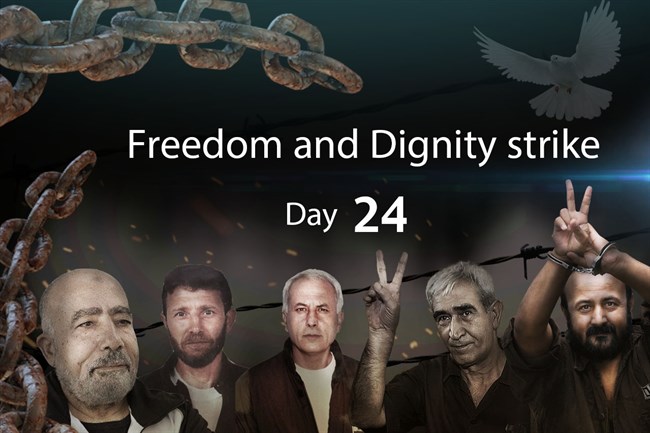

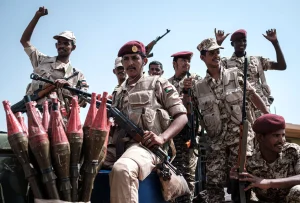



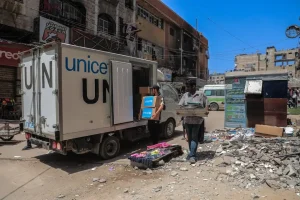
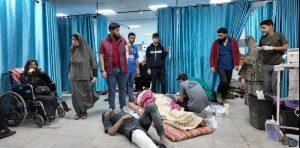
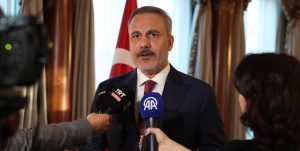

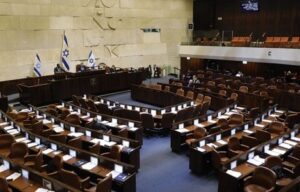


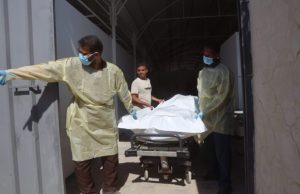















 Mina Indonesia
Mina Indonesia Mina Arabic
Mina Arabic